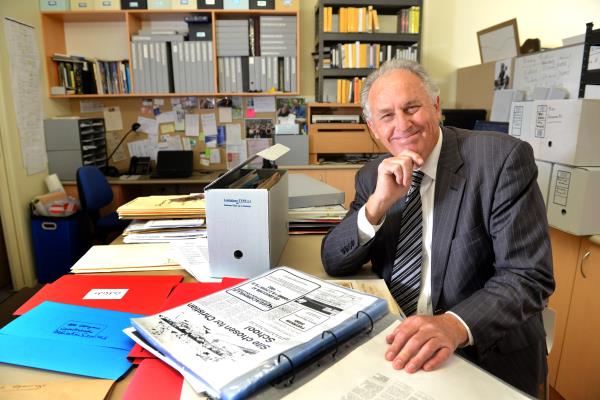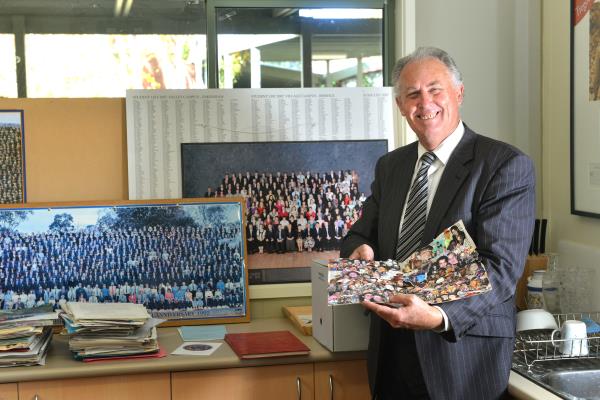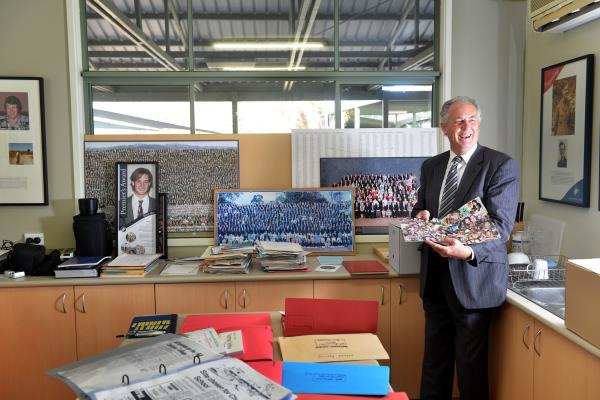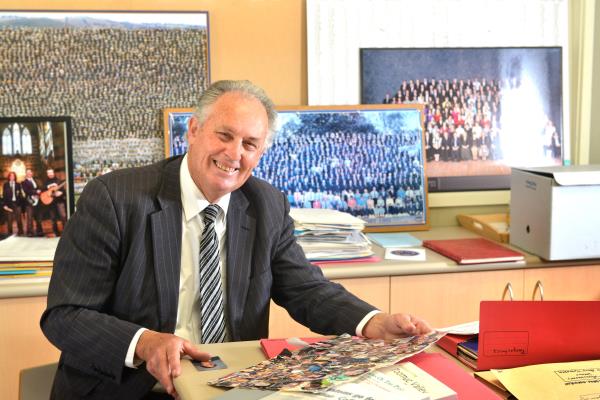By KATHRYN BERMINGHAM
PRECEDE: Beaconhills College archivist and photographer JOHN WATERHOUSE has built an impressive list of achievements throughout his 27 years’ service to the school. Now charged with documenting life at the school for future generations, he shares his own story with KATHRYN BERMINGHAM.
PULL QUOTE: “Archivists are funny animals. We’ve often got our heads 50 years in the past, but also 50 years into the future trying to work out what we should be saving, what could easily disappear.”
IF John Waterhouse hadn’t become a history teacher, he would have been an archaeologist.
“It wasn’t really an option in those days,” he explains, sitting in the archives room at Beaconhills College in Pakenham.
Luckily for 27 years of students, John’s passion for the practical side of history led him to teaching.
Starting as a religious studies teacher at the school in 1988, he moved into teaching history and then more recently into the role of archivist and photographer.
“They didn’t have a chaplain at that stage,” he recalls.
“It was perhaps an interest I had, but the history soon took over again, particularly when I started to get involved in local history.”
A passionate teacher, John encouraged his students to learn more about their stories within their family and local community.
“You go to a new district, and there often isn’t a lot of recorded history that you can draw on, so you have to actually find it to teach it to the kids.
“If you can involve them in the findings, then it’s even more interesting.
“They get to be historians and that’s the critical thing.”
His classes have inspired students to some incredible achievements, however John took most satisfaction in seeing them uncover stories close to home.
“We used to do a project every year where you interview and write about the oldest member of your family.
“You toss most things, but when they’ve interviewed the oldest member of their family, that’ll be a record of someone’s life for future generations.
“They may not value it greatly at the time, but one day they’ll be pleased.”
Though impressive, his role extends far beyond that of a passionate history teacher.
In 1994, John became involved in the newly established Community Services committee at the school.
“What happened in ’94 was Rwanda, and a bunch of very keen Year 11 kids got very enthusiastic about it and did a big fund-raiser and raised thousands of dollars, so we went and set up a bank account and we sent off the money.”
The generosity born out of the initial campaign snowballed, and the next few years saw the school become involved in regular food drives for The Brotherhood of St Laurence and Windermere.
“And then, of course, the Pakenham food bank started up in 1999, the 4Cs. So we’ve been supporting them every year since.
“We collect 5000 cans each year.”
Reeling off an impressive list of community service projects, he fondly recalls one campaign in particular.
Working with Fred Hyde, Beaconhills College set up a school to educate children on Bhola Island, Bangladesh.
The project initially cost $5000 and the school now requires $8000 each year to keep educating its 500 students. Fund-raising efforts have been so successful that a subsequent school has been built, as well as a kindergarten.
John plans to visit the school at the end of the year, and has begun work on the biography of Fred Hyde.
“Archivists are funny animals,” he explains.
“We’ve often got our heads 50 years in the past, but also 50 years into the future trying to work out what we should be saving, what could easily disappear.”
His primary role at the college is to record and preserve life at Beaconhills – fitting, since he has been such a large part of it.
John attends many significant events and documents the achievements of students for future generations.
He describes his role as an archivist as being “to collect, keep and catalogue”, and moving such a role into the digital age has been a difficult task.
The college uses a system called SearchTech to efficiently file all of their photos into a searchable database. Every year, all of the photos are kept in one central space and in the same consistent folders of events. With the help of a team of volunteer parents, John has scanned over 32,000 photos into the database, with a seemingly endless amount yet to be scanned.
Another part of his brief is to co-ordinate alumni activity, helping to recently launch an alumni association.
His passion and dedication to his work again emerges when he speaks of past students.
“I like to keep up with past students, hear about what they’re doing, and I think it can be really valuable for current students to hear that too.
“I caught up with a guy named Daniel O’Kane – he and his brother often performed at Cardinia Cultural Centre.
“He was always good at drama, we knew that, but I’d heard he’d become a maths lecturer. I like unusual stories, and so Daniel came and shared his story about how you go from being a drama star to a maths lecturer.”
Aside from his work at the school, John has also undertaken extensive research into the history of Toomuc Valley, documented in his books ‘The Orchard School’ and ‘A History of the Toomuc Valley Orchards.’ He has also published a book outlining the history of Beaconhills College.
In 2014, he was shortlisted for Cardinia Shire’s Citizen of the Year Award for his services to the local community, and currently services as the network meeting co-ordinator for the Australian Society of Archivists.
Tasked with documenting the history of the college, John Waterhouse has undoubtedly cemented himself as a crucial part of that story. As for retirement plans? Not just yet.
“I don’t think I’ll ever completely retire, I joke with the kids that I’ll be buried just out here,” he laughs.
“I love this job.”










